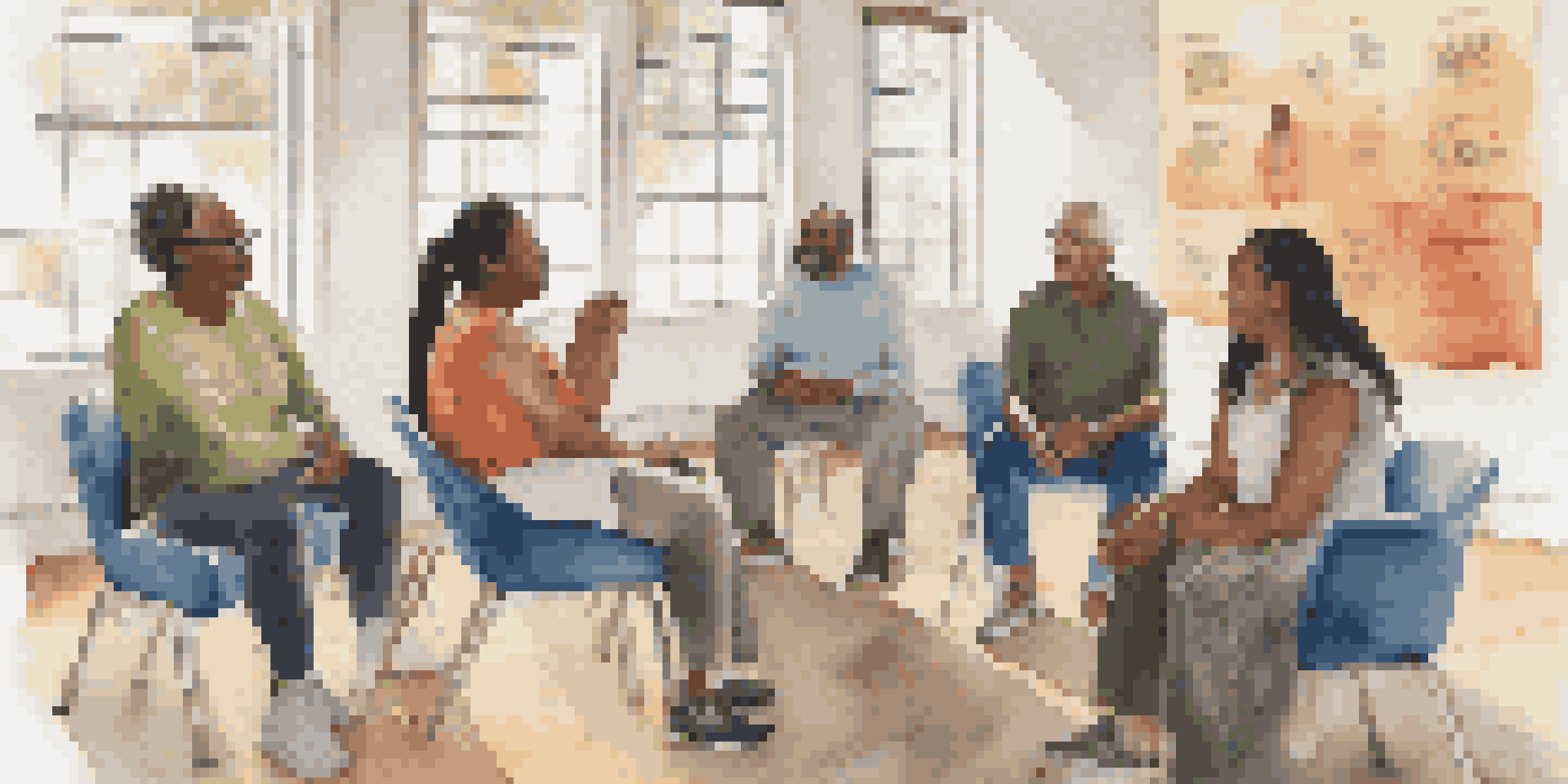The Impact of Social Media on Health Equity Awareness

Understanding Health Equity and Its Importance
Health equity refers to the principle that everyone deserves the same opportunities for health, regardless of their social or economic status. It's a crucial concept because disparities in health can lead to poorer outcomes for marginalized groups. By addressing these inequities, we create a healthier society overall, where everyone can thrive.
Health equity means that everyone has a fair and just opportunity to be healthier.
For instance, consider how a low-income neighborhood might lack access to fresh food or quality healthcare facilities. These environmental factors can significantly affect health outcomes, leading to chronic conditions that are preventable. Raising awareness around these issues is vital for fostering a more equitable health landscape.
Social media platforms amplify these conversations, enabling individuals and organizations to share their experiences and advocate for change. This connectivity not only educates users but also builds community support around health equity initiatives.
Social Media as a Tool for Advocacy
Social media has become a powerful tool for advocacy, allowing voices that were once marginalized to be heard. Platforms like Twitter and Instagram provide a space for activists to share stories, challenges, and successes related to health equity. This democratization of information plays a pivotal role in raising awareness on critical health issues.

For example, campaigns like #BlackLivesMatter have expanded discussions around healthcare disparities affecting Black communities. By leveraging hashtags and viral content, these movements not only inform but also mobilize support for systemic change in health policies.
Health Equity Benefits Everyone
Addressing health disparities leads to improved outcomes for marginalized groups and a healthier society overall.
Moreover, social media allows for real-time engagement, where advocates can quickly respond to emerging health crises or injustices. This immediacy helps maintain momentum in advocacy efforts, keeping health equity at the forefront of public discourse.
The Role of Influencers in Health Messaging
Influencers on social media wield significant power in shaping perceptions about health equity. Their ability to reach large audiences means that they can effectively disseminate information and raise awareness about health disparities. By discussing their personal experiences or spotlighting community issues, they help humanize abstract concepts.
Social media is a tool for the people, allowing voices that were once marginalized to be heard.
For instance, health influencers sharing their struggles with healthcare access can resonate deeply with followers facing similar challenges. This relatability fosters empathy and encourages conversations around the need for equitable health solutions.
As influencers promote health equity, they can also partner with organizations dedicated to this cause, amplifying their messages further. This collaboration can lead to impactful campaigns that educate audiences and drive action toward systemic change.
Spreading Awareness Through Personal Stories
Personal stories shared on social media can be powerful catalysts for change. When individuals recount their health journeys, they highlight the real-life implications of health inequities. These narratives can evoke empathy and provoke thought, prompting followers to consider the broader implications of these issues.
For example, a single mother's post about her struggle to access affordable healthcare can resonate with many, making it easier for others to connect with her situation. Such stories often inspire collective action, compelling communities to rally for better health resources.
Social Media Amplifies Advocacy
Platforms like Twitter and Instagram empower individuals to share their stories and mobilize support for health equity initiatives.
Social media platforms encourage storytelling through various formats, such as videos, posts, and live discussions, making it accessible for everyone. This shared vulnerability fosters a sense of solidarity among users, reinforcing the need for health equity.
Challenges in Leveraging Social Media for Health Equity
Despite the benefits, there are challenges associated with using social media to promote health equity. Misinformation can spread just as quickly as accurate information, leading to confusion and fear among users. This makes it essential for advocates to provide clear, factual resources that counteract false narratives.
Moreover, not everyone has equal access to social media or the internet, which can exacerbate existing disparities. Communities without reliable internet access may miss out on vital information and resources, further widening the gap in health equity.
To address these challenges, it's crucial for advocates to engage in multi-channel strategies that include offline efforts, ensuring that health equity messaging reaches diverse audiences, regardless of their access to technology.
Building Community Connections Online
Social media fosters community connections that are vital for promoting health equity. Online groups and forums provide spaces for individuals to share experiences and resources, creating a sense of belonging among those facing similar challenges. This support network can be a lifeline for many, offering encouragement and practical advice.
For example, a Facebook group dedicated to mental health awareness can serve as a safe space for individuals to discuss their struggles and seek help. These interactions can empower users to advocate for their health needs more effectively.
Personal Stories Drive Change
Sharing personal health journeys on social media can evoke empathy and inspire collective action for better health resources.
Additionally, community-driven initiatives often gain traction through social media, where users can rally support for local health projects. This grassroots approach can create meaningful change that resonates within communities, reinforcing the importance of health equity.
Future Trends in Social Media and Health Equity Awareness
Looking ahead, the relationship between social media and health equity awareness is likely to evolve. As technology advances, new platforms and tools will emerge, offering fresh opportunities for advocacy and education. For instance, augmented reality (AR) could enable users to visualize health disparities in their communities, making the issue more tangible.
Moreover, the increasing focus on mental health and well-being in social media campaigns suggests a growing recognition of the interconnectedness of health issues. Advocates can leverage this trend to highlight how social determinants of health impact mental health outcomes.

Ultimately, as more individuals engage with health equity topics online, we can expect a more informed and active public. This collective awareness can lead to a stronger push for policies that address health disparities and foster a fairer healthcare system.